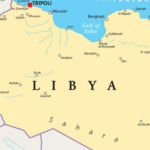Italy on Monday reported five deaths and more than 200 coronavirus cases, amid growing anxiety about the spread of the virus in the heart of Europe.
Two virus clusters developed last week in the northern regions of Lombardy and Veneto.
Infections have also been reported in the neighbouring regions of Emilia-Romagna and Piedmont.
Civil Protection Agency chief, Angelo Borrelli, reported 219 cases of contagion, including the five dead and three pre-existing Covid-19 patients in Rome, one of whom has recovered and has left hospital.
The figures make Italy the country with the highest number of Covid-19 cases in Europe, and the third in the world after China and South Korea.
All of the Italian deaths, including two announced on Monday, concerned people aged 68 and above, most of them with pre-existing health problems. A woman who died on Sunday, for example, was a cancer patient.
Borrelli said there were 167 cases in the Lombardy region, home to the city of Milan, 27 in the Veneto region around Venice, 18 in Emilia-Romagna and 4 in Piedmont.
Some 122 patients have been hospitalised, including 23 under intensive care, while 91 less serious cases are under isolation at home, the civil protection agency chief said.
In response to the crisis, the Italian government decided on Saturday to seal off 10 towns in Lombardy and one in Veneto identified as two separate virus clusters, isolating tens of thousands of people.
In addition, schools, museums and universities were closed in much of northern Italy, Venice’s famous Carnival was called off, and landmark monuments like Milan’s Duomo cathedral were shut.
“All of Northern Italy held ransom by the virus,’’ ran a front-page headline in the La Stampa newspaper, while La Repubblica daily wrote, ‘’Half of Italy under quarantine.”
As online videos and photos showed empty shelves and long queues at supermarkets in Milan, Lombardy President Attilio Fontana said there was no need for panic buying, as food supply was secured, and concern was spreading to Italy’s neighbours.
Overnight, Austria briefly blocked incoming rail traffic from Italy after two suspected cases were detected on a Venice-Munich train, but they tested negative for the novel coronavirus.
Italy’s government has proposed a meeting with the health ministers from neighbouring countries, and insisted that closing national borders essentially suspending Europe’s free-travel Schengen rules was no solution.
40 Italians from Lombardy and Veneto were not allowed to disembark from an Alitalia flight upon landing in Mauritius, and told they had to go under quarantine.
In a statement, Alitalia said it was arranging for their immediate return home, adding that the 40 had not reported any symptoms of the disease.
Meanwhile, Borrelli stressed that Italy was still safe for foreigners.
“We have recorded two clusters in our country; we intervened with extensive and tough measures, and therefore, we think that our country is safe and that you can come here with no problems,’’ he said.
In Brussels, EU Crisis Management Commissioner, Janez Lenarcic warned member states against taking rash decisions, such as Schengen border closures.
Any measures should be based on credible risk assessments and scientific advice and be proportionate to the level of danger, as well as being coordinated with other EU capitals, Lenarcic said.
EU member state experts were due to meet in Brussels on Monday, and a team of World Health Organisation (WHO) and EU experts were expected in Italy on Tuesday.
Lenarcic’s comments came as the European Commission announced 232 million Euros (251 million Dollars) in aid to help tackle the global coronavirus outbreak.
Sweden will also give 40 million kronor (4 million Dollars) to the WHO’s Contingency Fund for Emergencies, announced by Peter Eriksson, minister for International Development Cooperation.
WHO chief, Tedros Adhanom Ghebreyesus, welcomed the support.
“The past few weeks have demonstrated just how quickly a new virus can spread around the world, causing widespread fear and disruption,’’ Tedros said in a brief video feed from Geneva.
He noted that data from China “continued to show a decline in new cases, which shows that the strategy of containment is having an impact in China.’’
Tedros, however, reiterated the WHO’s concern about the rapid increase in recent cases in Iran, Italy and South Korea.(dpa/NAN)

 Join Daily Trust WhatsApp Community For Quick Access To News and Happenings Around You.
Join Daily Trust WhatsApp Community For Quick Access To News and Happenings Around You.


